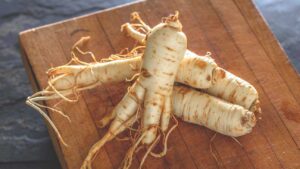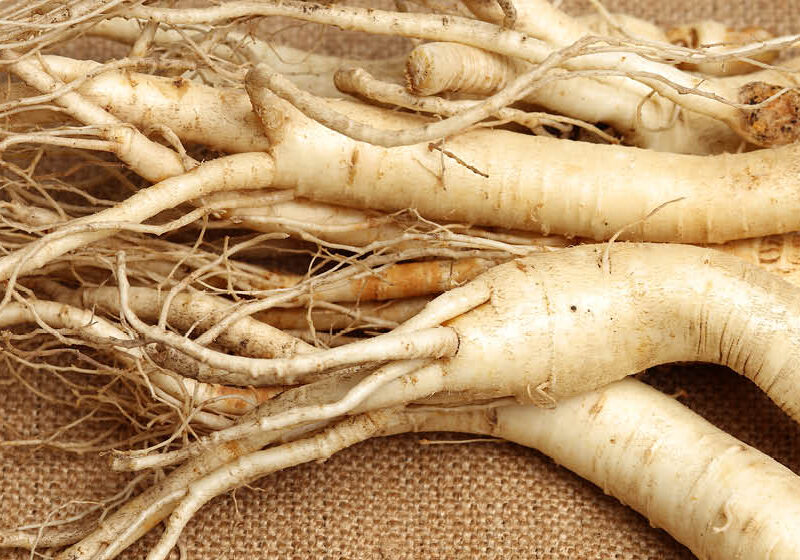Ginseng is a medicinal herb that has been used for centuries in traditional medicine, particularly in Asian cultures. It is known for its potential health benefits and adaptogenic properties.

Types of Ginseng
- There are several types of ginseng, but the two most well-known and widely used varieties are Asian or Korean ginseng (Panax ginseng) and American ginseng (Panax quinquefolius).
- Siberian ginseng (Eleutherococcus senticosus), although not a true ginseng, is sometimes referred to as “eleuthero” and is also used for its adaptogenic properties.
Medicinal Uses
- Ginseng is considered an adaptogen, which means it may help the body adapt to stress and maintain overall balance.
- It has been used traditionally to boost energy, enhance mental alertness, improve physical stamina, and reduce stress and fatigue.
- Some people use ginseng to support immune function, enhance cognitive function, and address various health issues.
Active Compounds
- Ginseng contains several bioactive compounds, including ginsenosides, which are believed to be responsible for many of its medicinal properties.
- The composition of ginsenosides can vary depending on the type of ginseng and its age.
Health Benefits
- Research suggests that ginseng may have potential health benefits, including:
- Energy and Endurance: Ginseng may help improve physical stamina and reduce fatigue.
- Cognitive Function: Some studies indicate that ginseng may support cognitive function, including memory and attention.
- Stress Reduction: Ginseng’s adaptogenic properties may help the body cope with stress.
- Immune Support: It may enhance the immune system’s response to infections and illnesses.
Traditional Uses
- Ginseng has a long history of use in traditional Chinese medicine and Korean traditional medicine.
- It is often used as a tonic to promote overall health and vitality.
Forms of Consumption
- Ginseng is available in various forms, including capsules, tablets, extracts, teas, and dried root slices.
- The dried root can also be used in cooking and soups, especially in Asian cuisine.
Precautions
- Ginseng is generally considered safe when used appropriately and for short durations.
- However, it can interact with medications, and long-term, high-dose use may lead to side effects.
- Individuals with certain medical conditions or those taking medications should consult with a healthcare provider before using ginseng supplements.
Authenticity and Quality
- The quality and authenticity of ginseng products can vary. It’s essential to purchase ginseng from reputable sources to ensure product purity and quality.
Sustainability Concerns
- Ginseng cultivation and wild harvesting have raised sustainability concerns, as the plant takes several years to mature. Efforts are being made to promote responsible harvesting and cultivation practices.
Cultural Significance
- Ginseng holds cultural significance in Asia and is often given as a gift symbolizing health, well-being, and longevity.
In addition, it is generally safe for many individuals, it’s important to use it cautiously and consult with a healthcare provider if you have specific health concerns or taking medications. Also the type and quality of ginseng products can vary, so it’s advisable to choose reputable sources when considering ginseng supplementation.










